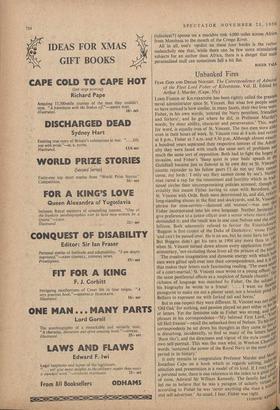Unbanked Fires
FEAR GOD AND DREAD NOUGHT. The Correspondence of Admiral of the Fleet Lord Fisher of Kilverstone. Vol. II. Edited by Arthur J. Marder. (Cape, 35s.) LORD FISHER OF KILVERSTONE has been rightly called the greatest naval administrator since St. Vincent. But what few people went to have noticed is how similar, in many facets, their two lives were. Fisher, in his own words, 'entered the Navy penniless, friendless and forlorn'; and he got where he did, in Professor Marder's words, `by sheer ability, character and perseverance.' This, word for word, is equally true of St. Vincent. The two men were alike even in their hours of work. St. Vincent rose at 4 a.m. and retired at $ p.m., Fisher at 5 a.m. and 9.30 p.m. Although almost exactlY a hundred years separated their respective tenures of the Adnlir; alty they were faced with much the same sort of problems and much the same sort of opposition. Both had to fight the bogey of invasion, and Fisher's 'Sleep quiet in your beds' speech at the Guildhall became just as famous in its own day as St. Vincent's, caustic rejoinder to his fellow peers CI do not say they canon' come, my lords: I only say they cannot come by sea'). Neither man cared a rap for the resentment and hostility which in tract' tional circles their uncompromising policies aroused; though rod' evitably this meant Fisher having to cope with Beresford, an St. Vincent with Orde. Both were determined to, and did, refori?; long-standing abuses in the fleet and dockyards, and St. Vince? t phrase for time-servers—`damned old women'—was one that Fisher incorporated into his own language. Neither hesitated give preference to a junior officer over a senior where merit clearer demanded it; and the result was in one case Nelson and the othe Jellicoe. Both adamantly refused to favour the Establishment. 'Buggins is first cousin of the Duke of Dankshire,' wrote Fisher `and can't be passed over. He is an ass, but he must have his ttalloi But Buggins didn't get his turn in 1904 any more than in 18,4 when St. Vincent turned down almost every application front t".. aristocracy, 'not excluding those from all the princes of the Weill The creative imagination and dynamic energy with which bg,is men were gifted spill over into their correspondence, and it is tj:d that makes their letters such fascinating reading. 'The mere so0,10, of a court-martial,' St. Vincent once wrote to a young officer, t;ri5 the same pestilential effects as a suspicion of female chastity. Tr of richness of language was matched by Fisher. On the subject °t his biography he wrote to a friend: `. . . I want no &Woe panegyrist to make me out a plaster saint, nor a boudoir pio' Bellairs to represent me with forked tail and horns.' lied But in one respect they were different. St. Vincent was not Olio `Old Oak' for nothing, and passion, played no part either in his me or letters. Yet the feminine side in Fisher was .strong, and soviro phrases in his correspondence—'My beloved First Lord,' apy till Hell freezes'—recall the unbanked fires of Nelson. To his r1,,,1 (it correspondents he set down his thoughts as they came to In""cled is disturbing, incidentally, to find so many of the letters flearheit 'Burn this'), and the directness and vigour of the style create bilf5 own self-portrait. This was the man who, in Winston Churc,licsi words, 'sustained the power of the Royal Navy at the most Cr.
period in its history.' ossrs , It only remains to congratulate Professor Marder and a'PHis Jonathan Cape on a book which as regards editing, it'ded o° selection and presentation is a model of its kind. If I maY e"toic1(; a personal note, there is one reference in the index to a great`0l VII of mine, Admiral Sir William Kennedy. The family had 0, VII! led me to believe that he was a paragon of sailorly virlue;opi; according to Fisher he was 'never anything else than a win and self-advertiser.' As usual, I fear, Fisher was right. rod LUDOV Or'l










































































 Previous page
Previous page